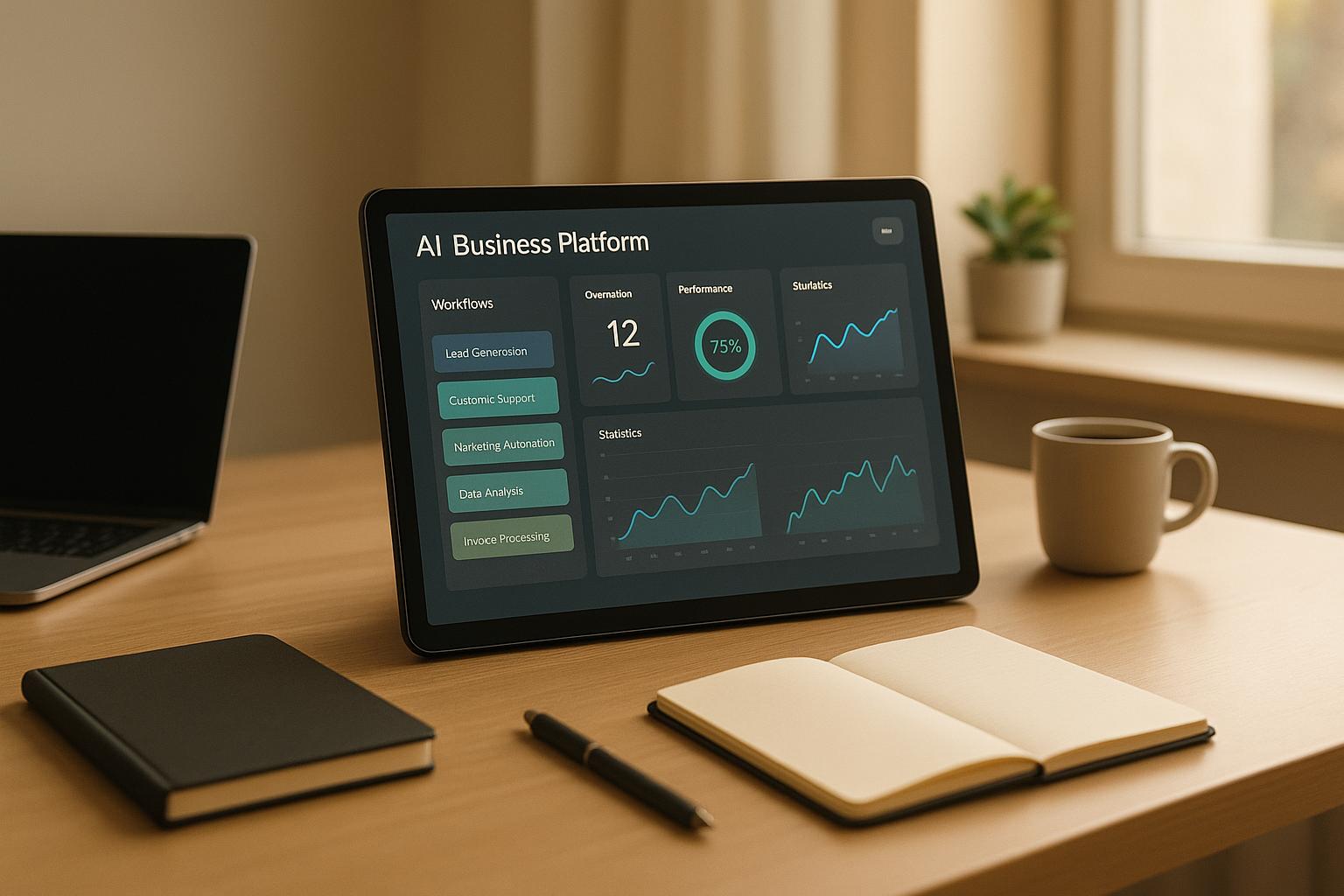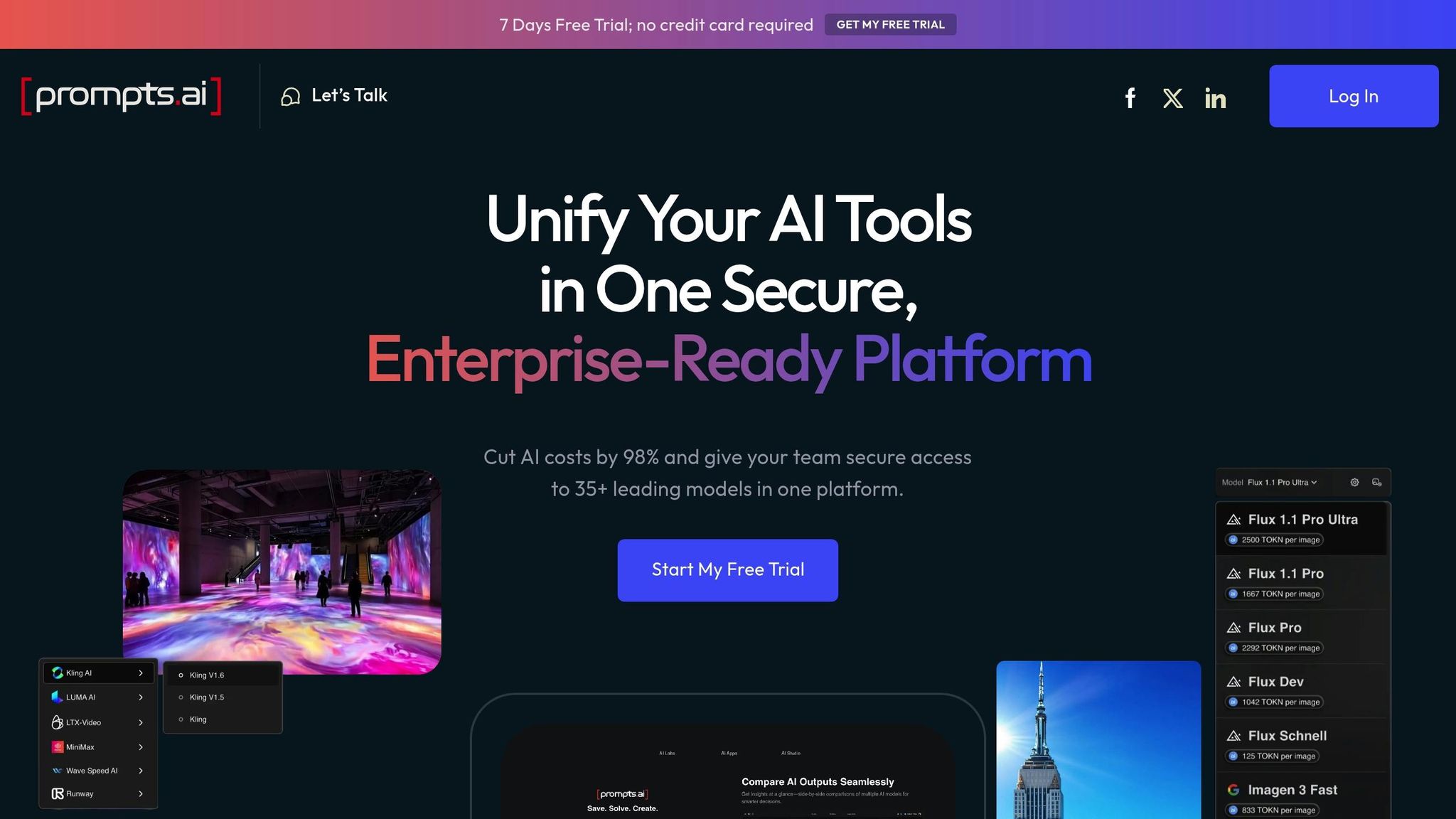
AI business platforms simplify complex workflows, reduce costs, and improve governance by unifying tools into a single system. Among the top options, Prompts.ai stands out for integrating 35+ language models, automating workflows, and offering real-time cost tracking. It addresses key business needs like interoperability, cost management, and compliance, making it ideal for enterprises seeking efficiency and scalability.
Key Highlights:
Quick Comparison:
| Feature | Prompts.ai | Standard AI Platforms |
|---|---|---|
| Model Access | 35+ models, unified interface | Limited (1-2 models) |
| Workflow Automation | Pre-built workflows, prompt templates | Basic API calls |
| Cost Management | Real-time tracking, TOKN credits | Minimal reporting |
| Governance | Full audit trails, role-based access | Basic logging |
| Scalability | Rapid onboarding, flexible growth | Slow, resource-intensive |
For businesses wanting to cut AI costs by up to 98%, streamline operations, and ensure compliance, Prompts.ai offers a clear edge.

Prompts.ai is an enterprise-grade AI orchestration platform designed to simplify and streamline AI operations for U.S. businesses. By integrating over 35 top-tier large language models into a single, secure interface, it tackles the common challenges of managing multiple AI tools, such as tool sprawl, while ensuring strict compliance and governance.
Prompts.ai offers seamless access to 35+ leading language models, including GPT-4, Claude, LLaMA, Gemini, Flux Pro, and Kling, all through a unified interface. This eliminates the hassle of juggling multiple providers and allows businesses to switch between models effortlessly. Teams can compare model performance side-by-side, helping them identify the best fit for specific tasks without needing to manage multiple vendor relationships or technical integrations.
What sets Prompts.ai apart is its ability to enable real-time testing and comparison of model outputs. This is especially useful for enterprises that require consistent results across departments using different AI models. The platform’s interoperability simplifies workflows, paving the way for more efficient automation.
Prompts.ai goes beyond model integration by enhancing operational efficiency with automated workflows. Ad-hoc AI experiments can be transformed into standardized, repeatable processes, thanks to built-in automation features. One standout feature is the "Time Savers" collection - pre-built workflows crafted by prompt engineering experts. These workflows are ready to deploy and cover a range of common business scenarios.
The platform also supports standardized prompt management, enabling teams to create, test, and deploy prompt templates that ensure consistency across departments. This helps organizations move from experimental AI use to fully operational, production-ready solutions while minimizing time spent on repetitive tasks.
Managing AI expenses is a breeze with Prompts.ai’s built-in FinOps layer, which provides real-time visibility into token usage across all models and teams. This transparency addresses a major pain point for enterprises - understanding and controlling AI costs. By consolidating subscriptions and offering pay-as-you-go TOKN credits, the platform can help businesses cut AI expenses by up to 98%.
The cost management tools tie spending directly to business outcomes, making it easier for finance teams to measure ROI. Organizations can set spending limits, track usage by department or project, and choose models based on cost-effectiveness rather than guesswork. This level of financial control allows businesses to scale their AI efforts without unexpected budget overruns.
Prompts.ai ensures full auditability of all AI interactions, simplifying compliance with regulatory and internal governance requirements. The platform tracks who accessed which models, when, and for what purpose, creating a complete audit trail.
Its governance framework ensures that sensitive data stays under the organization’s control while still enabling teams to leverage cutting-edge AI capabilities. Built to meet the rigorous security demands of Fortune 500 companies, Prompts.ai includes features like role-based access controls and robust data protection measures that align with corporate policies.
Prompts.ai is built to grow with organizations, allowing them to add models, users, and teams in a matter of minutes without operational disruptions. From small creative agencies to Fortune 500 companies, the platform’s scalable architecture adapts to a wide range of needs.
The platform supports rapid onboarding of users and models, making it easy for teams to expand their AI usage. Additionally, businesses can access a global network of prompt engineers and training resources to speed up adoption across departments. Its architecture ensures that as usage grows, performance and security remain uncompromised, making it ideal for enterprises of all sizes. These features position Prompts.ai as a comprehensive solution for managing and scaling AI workflows efficiently.
Many traditional AI platforms rely on single-vendor solutions with limited capabilities, which often fail to meet the needs of businesses requiring robust, enterprise-level tools for handling intricate workflows and multi-model operations. These shortcomings are evident across several key areas, starting with model interoperability.
Most standard AI platforms restrict users to one or two primary language models, requiring separate subscriptions and integrations for additional options. This fragmented setup complicates operations, as teams must juggle multiple APIs, authentication systems, and billing processes from various vendors.
Without a unified approach to accessing models, businesses often find themselves locked into specific providers. This lack of flexibility makes it harder to evaluate performance or switch to models that better suit specific tasks. Additionally, the absence of side-by-side comparison tools forces teams to rely on manual testing to determine the best model for their needs.
Next, let's delve into how these platforms support - or fail to support - workflow automation.
Traditional platforms typically offer only basic automation through simple API calls, leaving businesses to create custom integrations on their own. This approach not only extends implementation timelines but also demands technical expertise that many organizations may not readily have.
These limitations in automation also ripple into cost management.
Conventional AI platforms often provide minimal usage reporting, making it hard to connect AI spending to actual business outcomes. Since these platforms usually require separate billing arrangements with multiple providers, consolidating expenses or negotiating discounts becomes a challenge. This fragmented billing structure can lead to higher overall costs and make it difficult for finance teams to forecast expenditures or assess the return on investment for AI initiatives.
Governance features on standard AI platforms are often underdeveloped. Many solutions offer only basic logging with limited audit trails, failing to provide the detailed tracking of user interactions, model usage, or data processing activities required by modern regulatory standards. Additionally, enterprise-grade security features, such as robust role-based access controls, are frequently lacking.
Scaling with traditional AI platforms can be a slow and resource-intensive process. Adding users, models, or integrations often involves weeks or even months of planning and onboarding. This sluggish pace can hinder an organization's ability to adapt to evolving market demands or seize emerging opportunities in the AI space.
Prompts.ai brings together over 35 large language models into a single, streamlined ecosystem, simplifying AI workflows and offering a host of benefits:
One potential challenge is the learning curve for new teams, as they may need time to adapt to the platform. However, Prompts.ai addresses this with thorough onboarding resources and dedicated training support to ensure a smooth transition.
This blend of powerful features and accessible support underscores the platform's ability to simplify AI integration while addressing any initial hurdles for new users.
When selecting an AI business platform for US enterprises, the decision hinges on three key aspects: the complexity of workflows, the need for budget control, and adherence to compliance standards. Companies managing intricate AI operations require a solution capable of handling multiple large language models while ensuring strict governance protocols. Prompts.ai addresses these demands by offering clear advantages in model integration, cost management, and scalability.
Prompts.ai stands out as a top choice for enterprises looking to streamline their AI workflows. By unifying over 35 language models into a single, efficient interface, the platform effectively tackles the common issue of tool sprawl. This consolidation not only simplifies operations but also delivers real value through its flexible pay-as-you-go TOKN credit system.
In addition to integration, Prompts.ai offers unmatched financial clarity, enabling smarter strategic decisions. For mid-sized businesses and Fortune 500 companies, the platform’s real-time FinOps tracking is a game-changer. It provides CFOs with the financial insights they need while ensuring compliance with stringent regulations - an essential feature for industries like healthcare, finance, and legal services.
The platform’s scalability is another major advantage, particularly for fast-growing enterprises. With expertly designed workflows and a dynamic community of prompt engineers, Prompts.ai delivers ongoing support and value far beyond the initial implementation.
For US enterprises grappling with fragmented AI tools and unpredictable expenses, Prompts.ai presents a comprehensive solution to achieve enterprise-level AI orchestration with ease and efficiency.
Prompts.ai integrates stringent security protocols and governance controls directly into its AI workflows, ensuring adherence to data governance regulations like GDPR and HIPAA. These safeguards include features such as strict access controls, advanced data encryption, and detailed audit trails, all designed to protect sensitive information effectively.
The platform also keeps pace with changing regulatory requirements by continuously monitoring and updating its systems. This approach allows businesses to stay compliant while maintaining peak performance and efficiency.
Prompts.ai enables businesses to cut down on AI costs with its pay-as-you-go system, driven by TOKN credits. This approach ensures you’re only charged for what you actually use. Through automated model routing, tasks are seamlessly directed to the most cost-effective AI models while maintaining top-notch performance. Plus, with real-time cost tracking, you get complete visibility into your expenses, making it easier to manage and fine-tune your budget.
Prompts.ai streamlines AI workflows by integrating more than 35 AI models into a single, unified platform. This setup makes it easier for businesses to collaborate in real-time, co-edit effortlessly, and keep track of expenses - all from one central hub.
With the flexibility to choose the most suitable models for specific tasks, teams can work more efficiently while maintaining better control over costs. Unlike older platforms that often fall short on integration and collaboration, Prompts.ai allows businesses to refine their AI processes without hassle.


